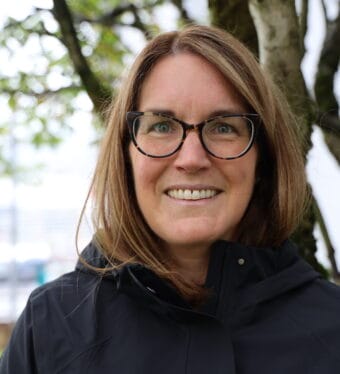- School Board
- Amber Frommherz
- Jenny Thomas
- Michele Stuart Morgan
- Will Muldoon
- Jeff Redmond
- Elizabeth (Ebett) Siddon
- District 2 Assembly
- Dorene Lorenz
- Emily Mesch
- Nano Brooks
- Mary Marks
- Maureen Hall
- District 1 Assembly
- Neil Steininger
- Connor Ulmer
- Mayor
- Beth Weldon
- Angela Rodell
Age on Oct. 1, 2024
46
Family (immediate/those you live with)
Chris Siddon and Luke SiddonOccupation
Fisheries BiologistPrevious government experience or community involvement
Statewide parent representative to the Alaska Early Childhood Coordinating Council (AECCC; 2017-2022)
Parent representative to the Governor’s Council on Disabilities and Special Education’s Early Intervention Committee (since 2015)
Juneau STEAM Coalition (since 2017)
Juneau Board of Education (since 2018)Highest level of education
PhD
Did you attend public school?
Yes
Briefly, what do you think is the most important part of K-12 education?
I think the most important part of K-12 education is to instill a love of learning. This might look different from kindergarten to high school. For example, for Kindergarteners, much of the learning happens through play. As students progress, they are introduced to different subject areas. At high school, students can begin to gravitate towards areas of interest through course selection and electives. As a woman in science, I believe that STEAM (science, technology, engineering, art, and math) education teaches critical thinking skills. A strong STEAM foundation prepares students in all subject areas and post-secondary pathways.

What makes you a good candidate for the Juneau school board?
I’m just finishing my second term on the board, and even before running for the school board, I’ve been really committed to public education and to the schools in Juneau. I bring a strong background in STEAM, I work as a fisheries biologist in my day job, and also a strong advocate for special education.
What do you think is the biggest challenge facing the Juneau School District right now?
The biggest challenge right now, I think, is settling out from the reconfiguration that the district went through last year. And with that comes, I also think, rebuilding trust in the board and the district and the community. Like, among all of the stakeholders, we are now in this new configuration. There are certainly going to be sort of pressure points we find as the dust settles around that, and we’ll continue to find solutions to those. But at the bigger level, I think it’s rebuilding the trust and the communication with the community.
Last year, the district had to solve an abrupt multimillion-dollar deficit in a matter of months. Not all residents were happy with the decisions made and it prompted a recall effort this election for two of its current members. Moving forward, what role does each school board member play in ensuring that the district remains on firm financial footing?
I think of this at various levels. First, I think it is our role as board members to support the efforts of the current chief financial officer in implementing, with fidelity, our new full financial software, including relational databases, and having a really full picture of current financial status. I think it’s also about supporting the board’s Finance Committee and the work that those board members will continue doing in establishing budget reports that get brought to the board in a way that is both informative for us and for the community to understand. And then I think it’s about starting the budget process earlier so we’re not in a situation where the community feels caught off guard or rushed in engaging with us in the decisions we have to make around the budget.
The school board voted to consolidate Juneau’s high schools and middle schools this past winter. And, with the uncertainty about education funding in the state and the district’s declining enrollment, do you think more school consolidation will be necessary in the future? If so, how will you tackle that situation?
I think if the declining trend in enrollment continues, we will likely be having a conversation about, or I should say, continuing the conversation we started this year around the potential need to close an elementary school. Thankfully, that process, we started that conversation a bit through last year’s process, so we have a little bit of information around some buildings that have particular facilities that wouldn’t be easy to replicate in other buildings. So it’s a little bit easier to know exactly where we might start that conversation.
With hundreds of more students at Juneau-Douglas High School: Yadaa.at Kalé this year, issues with the lack of parking have been a hot topic. What more could the district be doing to mitigate that?
I think it’s important to note the district has really no role in parking or issuing parking tickets, but we have been in communication with the city and with the police department in trying to find creative solutions. That also includes our partners at the University [of Alaska Southeast] for available parking spaces across the street.
Is student achievement where it should be in Juneau? What can the district do to improve reading and math scores as students grapple with major shifts in their school environments?
This is a topic, in my time on the board, I’ve continuously served on the program evaluation committee, so we learn a lot about the different academic programs across the district. And we look as a full board at achievement indicators of success every year. That’s the backbone to how we fund and put our dollars where we want them to be for achievement. And we have a program called the multi-tier systems of support in our elementary schools. And we’ve sort of leaned into that again after COVID trying to help students. The goal, if students are behind, make more than one year of academic growth in a year, and those sort of layered tiers of support are one way that we address that.